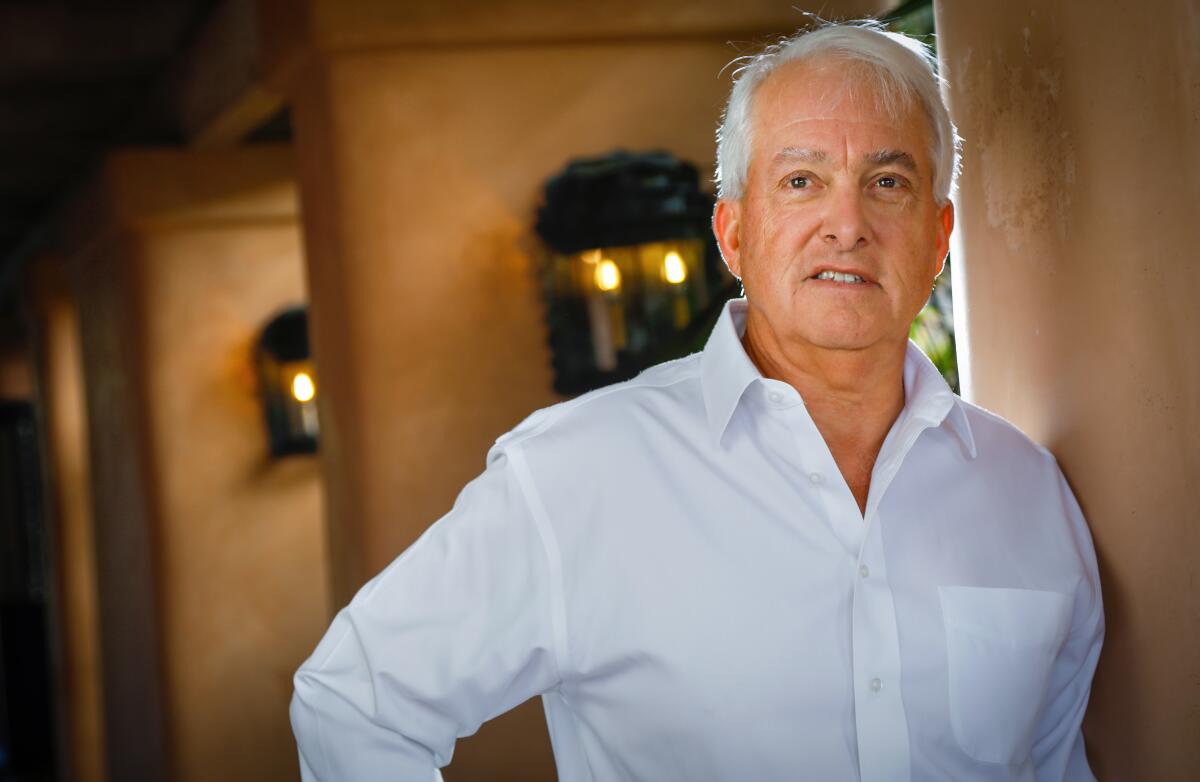
Multimillionaire recall candidate John Cox’s prior gubernatorial campaign has been ordered by a judge to pay about $100,000 to a political consulting firm that produced television ads for his unsuccessful 2018 race — one of a string of unpaid bills detailed in a lawsuit and campaign filings.
Cox’s campaign has refused to pay, leading to a “debtor’s examination” hearing next month in San Diego over the financial status of that campaign committee, according to court records.
“California needs to know the real story about John Cox. To be honest with you, he’s not who he says he is,” said Jim Innocenzi, the founding partner of Sandler-Innocenzi, the Virginia-based GOP firm that an arbitrator and a judge have ruled is owed nearly $55,000 for ads it produced and about $43,000 in attorney’s costs, interest and other fees as of September 2019. These awards have grown by 6% interest since then, plus additional attorney’s fees as Innocenzi has tried to collect the money.
A spokesman for Cox’s current gubernatorial campaign said the invoices were submitted late and that Cox contests the amount owed.
“There is a dispute over questionable, exorbitant fees to the campaign,” said spokesman Anthony Ramirez, adding that there was no money left in the 2018 account to pay outstanding bills. “These attacks are desperate and won’t work.”
What Ramirez references as attacks are in fact rulings in favor of the ad firm by arbitrator Patricia Latham in September 2019 and San Diego Superior Court Judge Daniel F. Link in February.
Emails contained in court filings show that while the campaign questioned some costs, it ultimately agreed to pay them. Then once the election was over, Cox demanded greater details on the invoices, which the firm provided. Despite top campaign officials urging Cox to pay Innocenzi’s firm, he declined to do so.
Innocenzi is particularly incensed by Cox refunding himself more than $66,000 during the fourth quarter of 2018 while not paying the California-based cast and crew that worked on the campaign’s final ads. Innocenzi said he paid them out of his pocket, expecting to be reimbursed by Cox.
“Who stiffs working people and puts the money in his own pocket?” Innocenzi said. “That’s not the kind of guy you want as governor.”
Wealthy candidates refusing to pay consultants after a loss has happened before.
Republican Senate candidate Carly Fiorina, another multimillionaire, and former head of Hewlett-Packard, repaid herself $1 million the day before the election in 2010, while leaving her consultants with more than $492,000 in unpaid bills. Fiorina paid those staffers, plus the widow of a man who died while working for her, but not until she faced headlines such as “Carly Fiorina, the deadbeat presidential candidate” as she launched her unsuccessful 2016 presidential bid.
“If you are running for office and seeking people’s support, and you hire people to perform a job or a service, and you don’t honor that agreement, I think that it reflects quite poorly on your personal character,” said GOP strategist Beth Miller, who was owed more than $20,000 by Fiorina’s campaign after the 2010 election. “And I think it’s more egregious if you are somebody of significant or substantial personal wealth that you are basically sticking it to people who have put themselves on the line for you.”
Miller briefly worked for Cox on his unsuccessful ballot measure that would have created a nearly 12,000-member legislature. Cox paid her the amount she was owed, Miller said.
Cox, a Rancho Santa Fe businessman, made his fortune in real estate, law, investment advising and property management. He has used his wealth to fund multiple unsuccessful runs for office: for Cook County recorder of deeds, Congress, U.S. Senate, president of the United States and, most recently, California governor in 2018. Cox announced in late January that he was running in the recall effort to oust Gov. Gavin Newsom.
Cox has faced campaign finance troubles previously. The Federal Election Commission fined him more than $22,000 in 2002 for failing to report about $220,000 in personal loans he made to his Illinois Senate campaign that year. Cox argued that his staff had made an innocent mistake and fought the fine in court. A judge ruled against him in 2004.
Cox’s 2018 gubernatorial campaign committee reported having $76,548 in unpaid bills as of the end of 2020, according to campaign finance disclosures it filed with the secretary of state’s office.
Other GOP consultants alleged that Cox owed former staff more than the unpaid bills detailed in the lawsuit and campaign finance reports.
Fundraiser Charles Moran, who worked on the successful primary phase of Cox’s 2018 gubernatorial campaign, provided contracts that showed the campaign agreed to pay him $10,000 per month in 2017 and $6,500 per month in 2018, or a percentage of the funds raised, whichever was greater.
The campaign paid his retainer for the time he worked for the campaign. But once funds began pouring in after President Trump and other national figures endorsed Cox in 2018, Moran said, his commission exceeded the retainer amount by $100,720 over four months.
Moran said the campaign refused to pay, offering him $29,632, which he agreed to in order to avoid a lengthy battle. Four months later, the campaign cut him a check for $7,811, which he deposited because he felt he had no other recourse.
“I was promised … that I would be compensated, that the bill would get paid. I kept up my end of the bargain, and John did not keep his,” said Moran, who does not work for any of the candidates running for governor in the recall election.
Ramirez said that Moran sought commissions for funds raised by others, a claim Moran disputed by providing detailed logs of the fundraising he oversaw.
“I absolutely thought about suing him,” Moran said. But “he would have bled me out. I’m a small-business owner, the sole proprietor and I can’t afford to do that.”